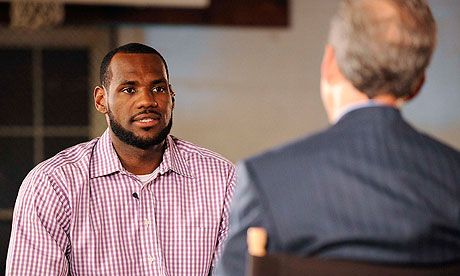Sent to you by moya via Google Reader:
 The other day, I was talking to my so-not-a-sports fan friend, rrrr about the LeBron James situation. I mentioned how people took real issue with the slavery as analogy aspect of the whole debate. I know I said something about the plantation model in my previous post about LBJ, but I wanted to return to it here.
The other day, I was talking to my so-not-a-sports fan friend, rrrr about the LeBron James situation. I mentioned how people took real issue with the slavery as analogy aspect of the whole debate. I know I said something about the plantation model in my previous post about LBJ, but I wanted to return to it here.
One thing I failed to mention in my LeBron James/plantation model discussion was his financial impact on Miami. I just read something about a restaurant in Miami offering a Lebron Burger, and a spa offering "The LeBroyal Treatment." Thinking about this in conjunction with the how financially hurt Cleveland will be with James' departure reminds me that the economic viability of these small institutions is directly affected by and reliant upon LeBron James' body, his literal presence in the city. If LeBron doesn't succeed in Miami, if he doesn't play–and play well– or if he leaves, then not simply the Heat, but these other businesses are in some trouble.
They all have a financial stake in his brand, which is essentially his body, his physical performance. How are we not supposed to be reminded of the plantation model, slavery etc. when we discuss this? Would it be acceptable to suggest that although athletes are not at all slaves, the economic structure–not condition–they operate under is reminiscent of the plantation model, because it is a situation where they've, until recently, exhibited comparably limited agency, and where their bodily labor greatly benefits the(ir) white owners? And how might we connect the public's general opinion that these athletes are greedy to the fact that the labor forces of the NFL (where contracts are not guaranteed and athletes are in the most danger) and NBA are overwhelmingly black? And that, in generating opinions about LeBron's (dis)loyalty to Cleveland we did, in effect, forget that he was an employee, and that our understanding of his decision to leave on some level must acknowledge that this was one of few times where we got to witness an athlete exercise all of his agency? (And such agency is fleeting, and thoroughly dependent on those knees go.)
What would be a different, less sensitive discourse that would better help delineate and understand this narrative?
I've recently become fascinated by boxing, I have a book list and everything; it's the most difficult and scariest sport I've ever tried. A few years ago, a professor mine told his class that you could tell a society's most subordinate group by watching boxing. There have always been black boxers. I think we can use sports to discuss larger social issues. And I think the LeBron James case is an opportunity to talk about the ways in which the plantation model endures. How can we begin with the caveat that athletes are not slaves, nor are they like slaves and still access this conversation? Or is it completely impossible?
Things you can do from here:
- Subscribe to Black Youth Project using Google Reader
- Get started using Google Reader to easily keep up with all your favorite sites
.jpg)
No comments:
Post a Comment